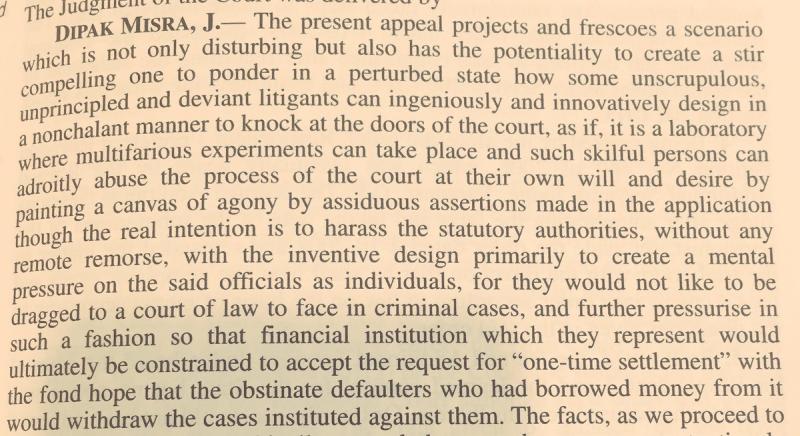
Supreme Court Justice Dipak Misra wrote a 192-word opening sentence in an order in 2015, to say that the case before him was a frivolous litigation filed to harass and arm-twist the opposing party into agreeing to an out-of-court settlement. Justice Misra’s frustration with the case, however, was particularly linked to the rampant abuse of a procedural provision.
TheGoanPatiala unearthed the sentence on Twitter yesterday:
Perhaps the longest sentence ever delivered by a Supreme Court of India Judge. t.co/LYGCIh0qyV
— TheGoanPatiala (@TheGoanPatiala) Wed, 24 May 2017, 13:57
In the judgment delivered on 19 March 2015, with Justice PC Pant, in the case of Priyanka Srivastava and Anr vs State of UP and Ors, Misra had written what must rank as one of the longest sentences ever written in a Supreme Court judgement:
The present appeal projects and frescoes a scenario which is not only disturbing but also has the potentiality to create a stir compelling one to ponder in a perturbed state how some unscrupulous, unprincipled and deviant litigants can ingeniously and innovatively design in a nonchalant manner to knock at the doors of the Court, as if, it is a laboratory where multifarious experiments can take place and such skillful persons can adroitly abuse the process of the Court at their own will and desire by painting a canvas of agony by assiduous assertions made in the application though the real intention is to harass the statutory authorities, without any remote remorse, with the inventive design primarily to create a mental pressure on the said officials as individuals, for they would not like to be dragged to a court of law to face in criminal cases, and further pressurize in such a fashion so that financial institution which they represent would ultimately be constrained to accept the request for “one- time settlement” with the fond hope that the obstinate defaulters who had borrowed money from it would withdraw the cases instituted against them.
Justice Misra had expressed his displeasure with how the case had progressed, at other places in the judgment, such as:
After the dismissal of the writ petition with the aforesaid observation, the respondent No.3, possibly nurturing the idea of self-centric Solomon’s wisdom, filed a Criminal Complaint […]
Justice Misra’s comments further down in the short 10-page judgment, however revealed the source of his frustration with the litigant. The litigant had, after defaulting on the repayment of a loan, made an application to the magistrate (under Section 156(3) of the Code of Criminal Procedure) to initiate a criminal investigation against the financial institution that had approved the loan. Misra wrote in the judgement:
In our considered opinion, a stage has come in this country where Section 156(3) Cr.P.C. applications are to be supported by an affidavit duly sworn by the applicant who seeks the invocation of the jurisdiction of the Magistrate. That apart, in an appropriate case, the learned Magistrate would be well advised to verify the truth and also can verify the veracity of the allegations. This affidavit can make the applicant more responsible. We are compelled to say so as such kind of applications are being filed in a routine manner without taking any responsibility whatsoever only to harass certain persons.
Justice Misra has previously attracted attention through the Arunachal Pradesh emergency lifting order, which was passed in under three minutes, to his Indian national anthem order, in which he noted that the court’s order should not be “overstretched”, and his much criticised order last year upholding India’s criminal defamation law.
threads most popular
thread most upvoted
comment newest
first oldest
first
threads most popular
thread most upvoted
comment newest
first oldest
first